




















































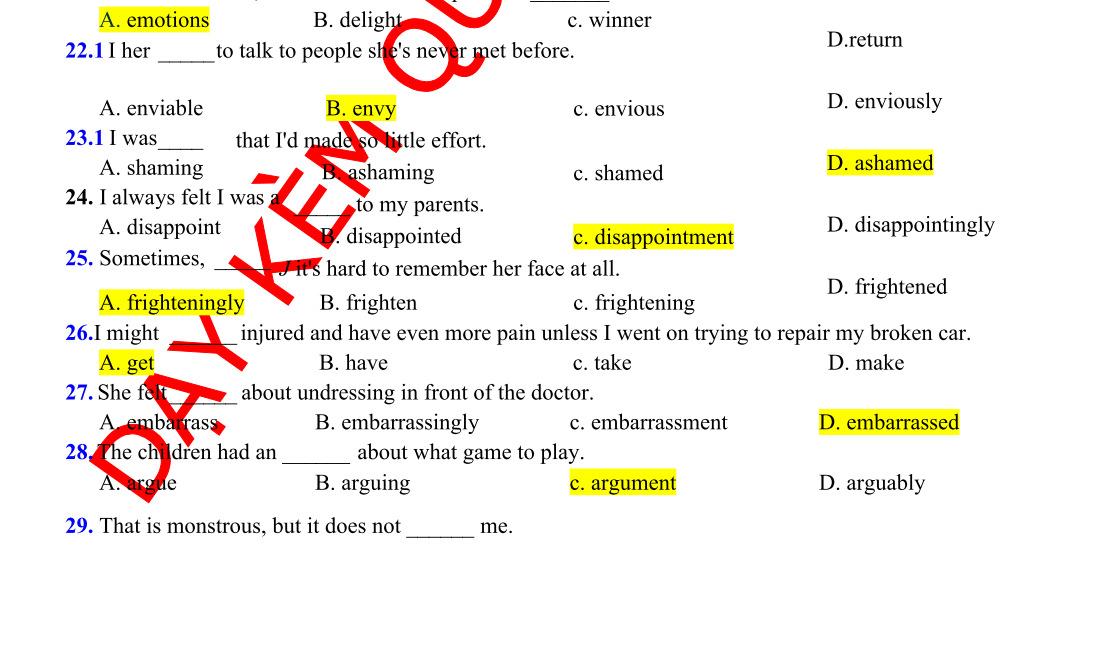























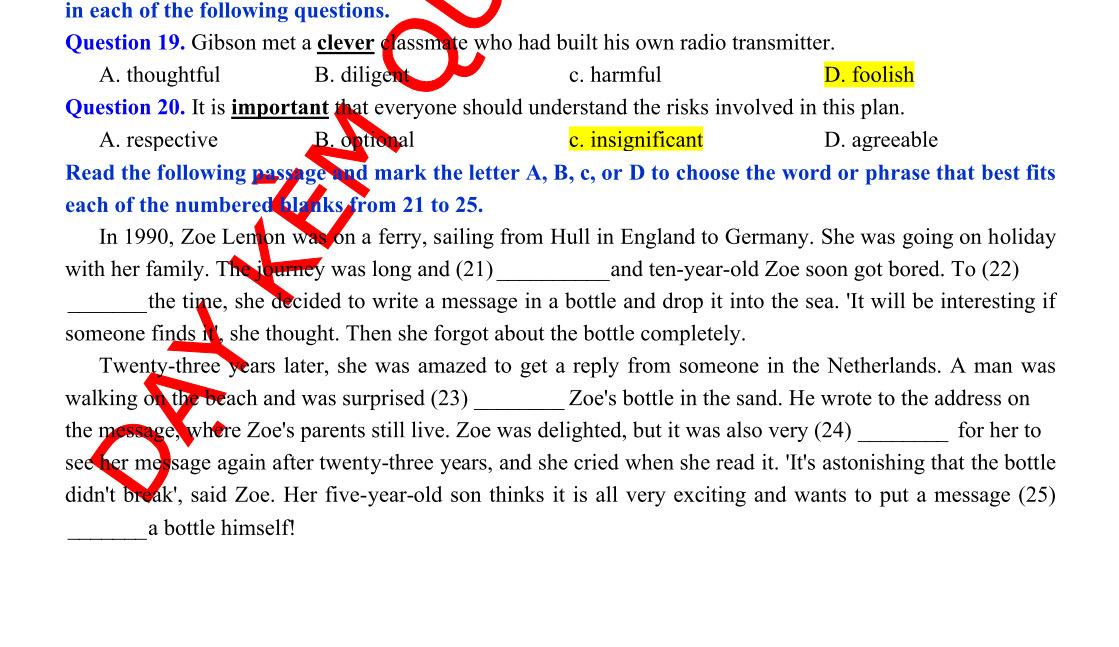













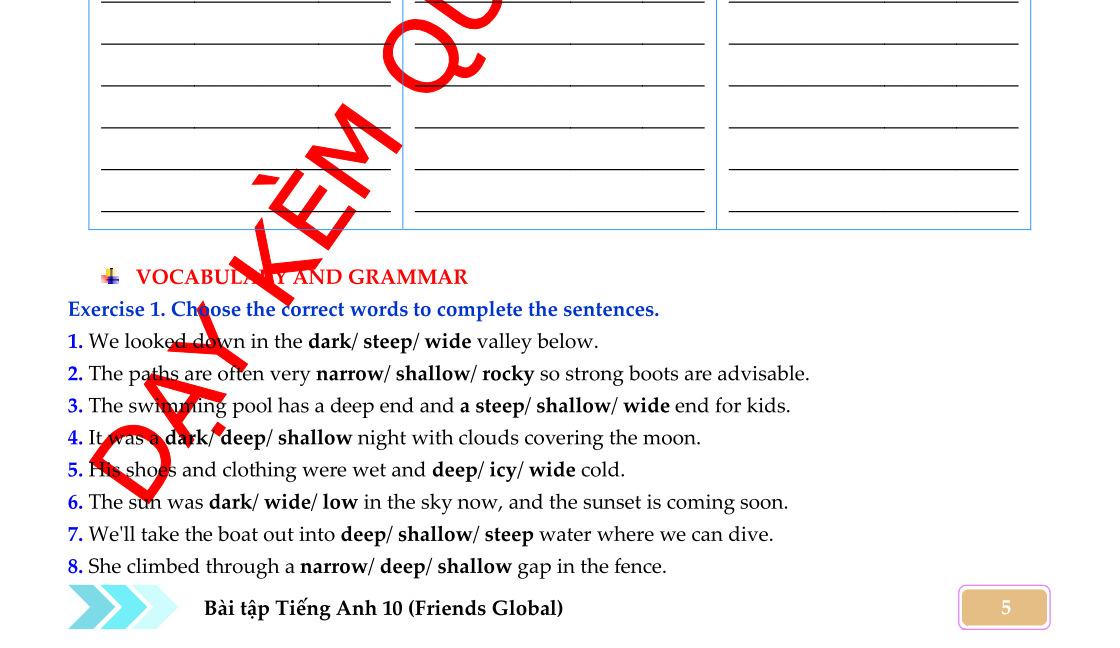










































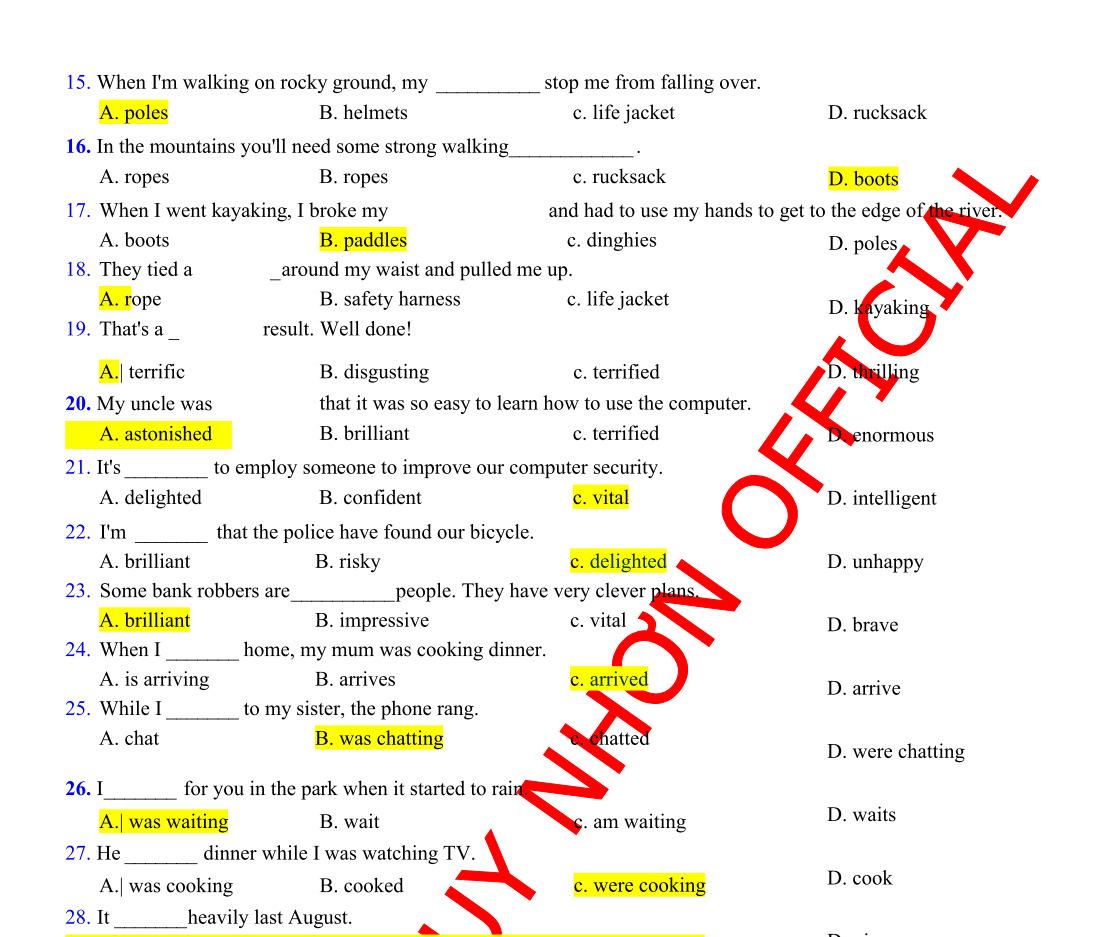



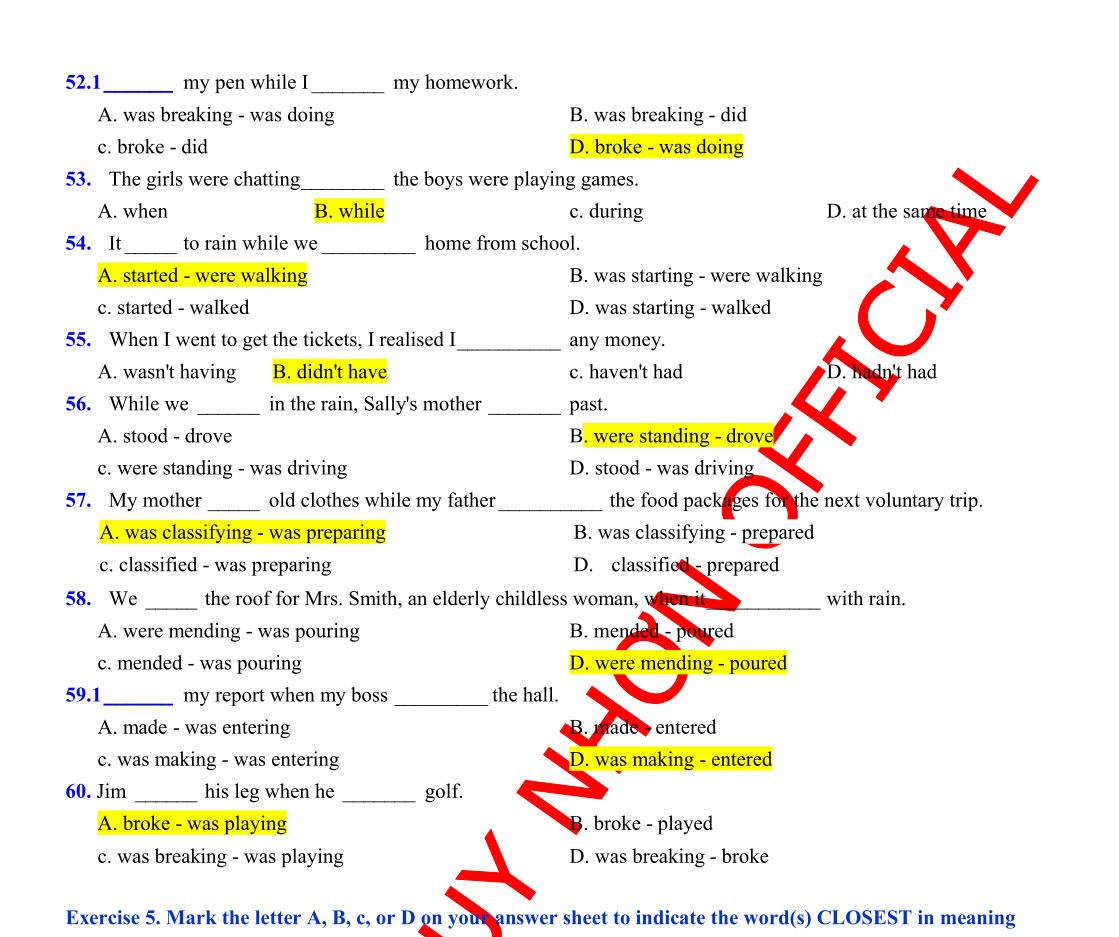






















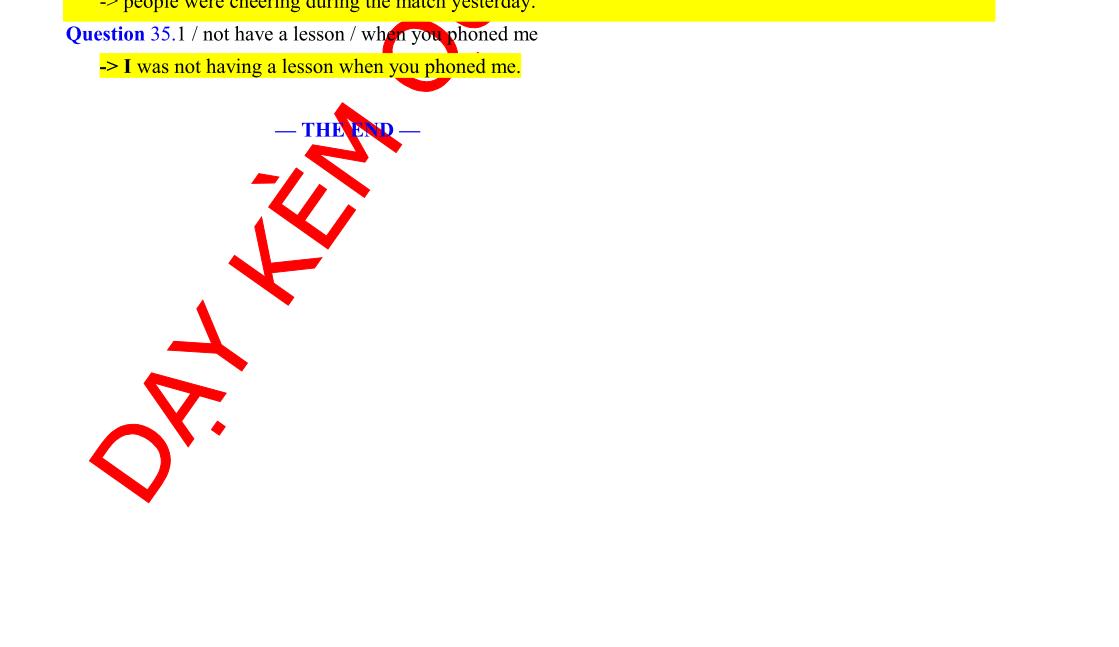
















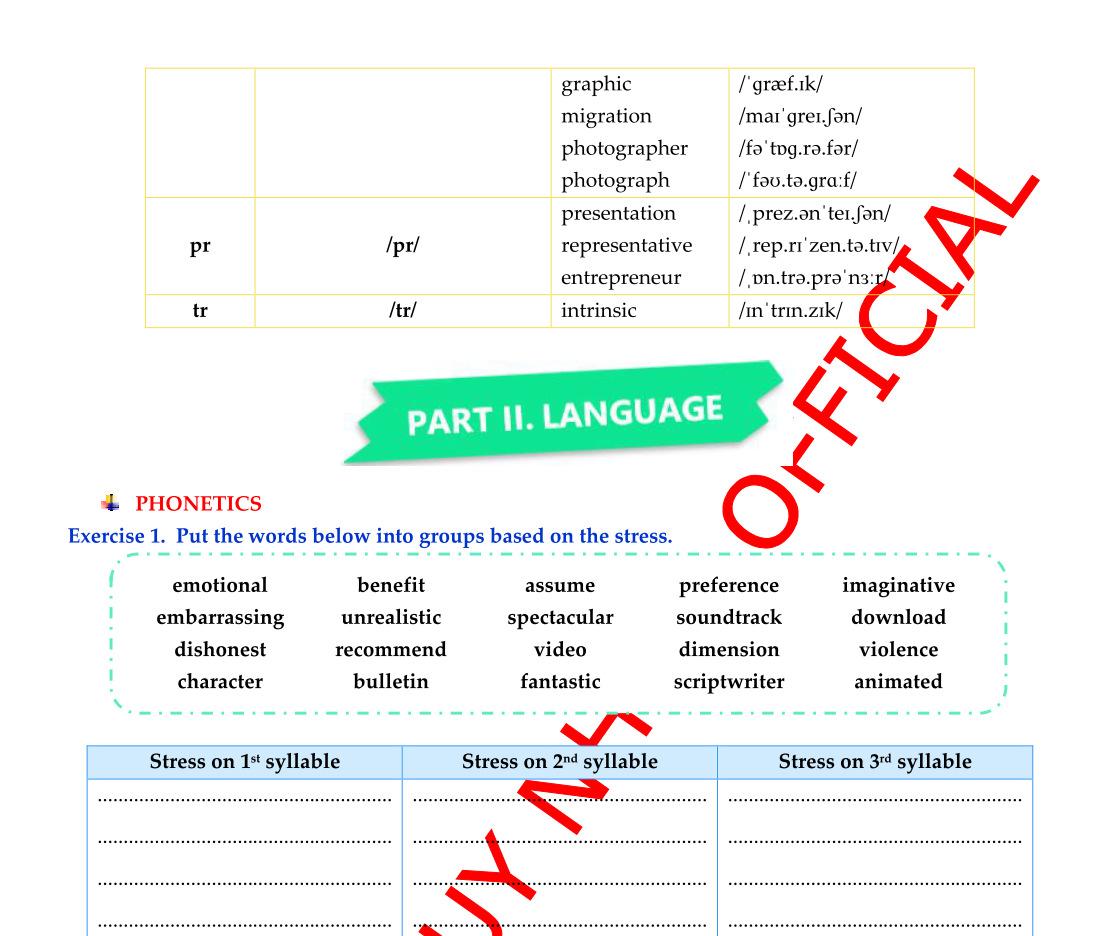




























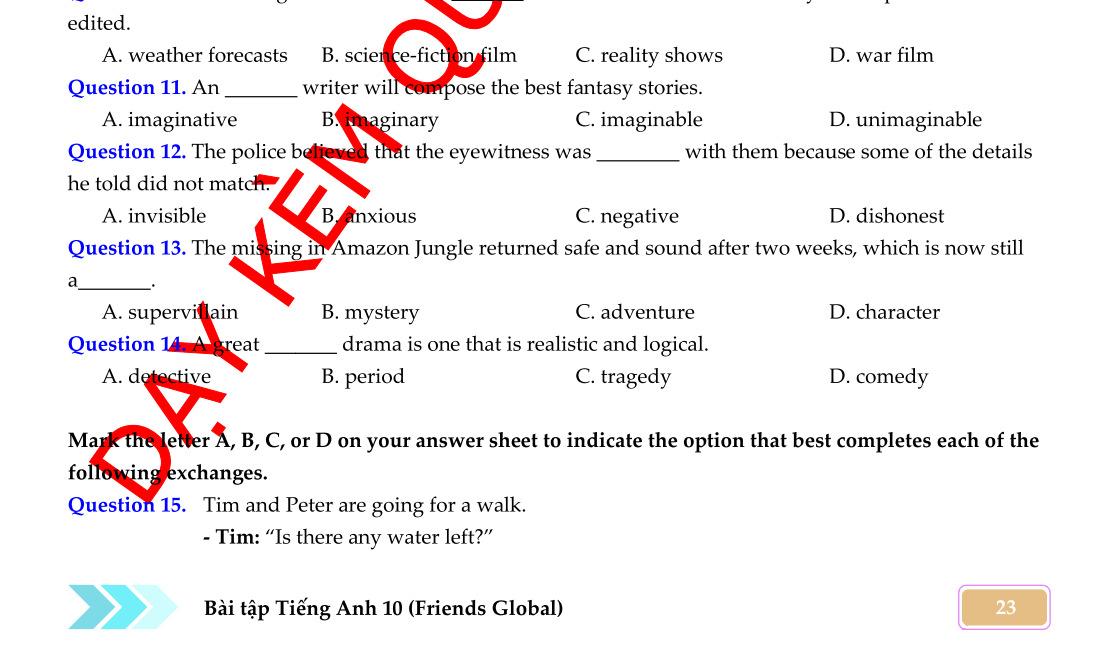

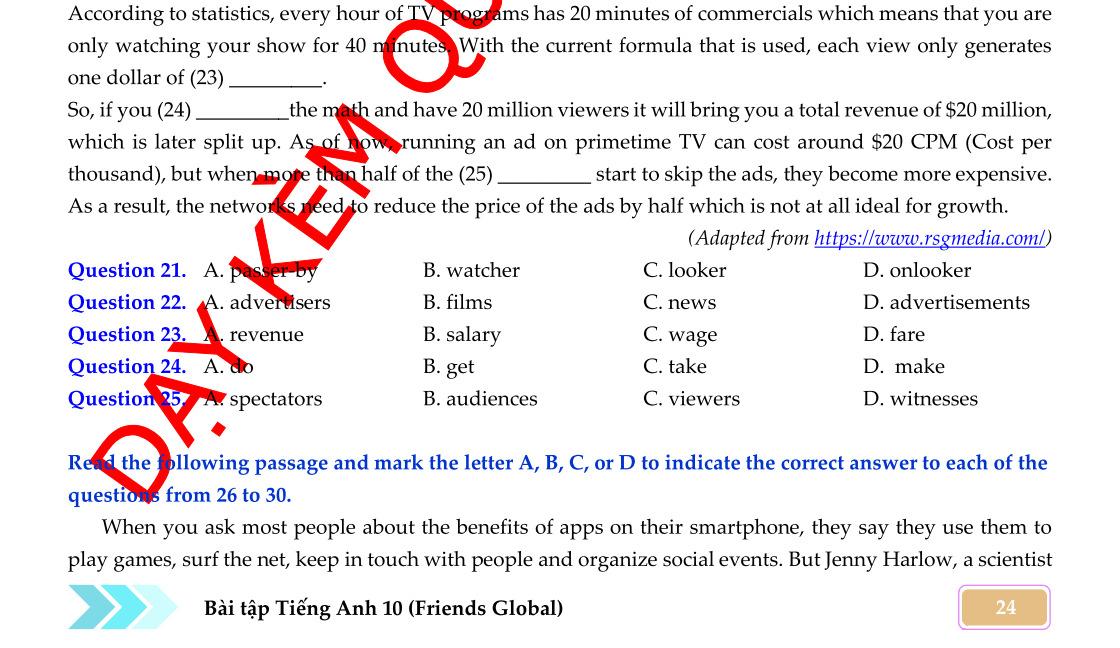
























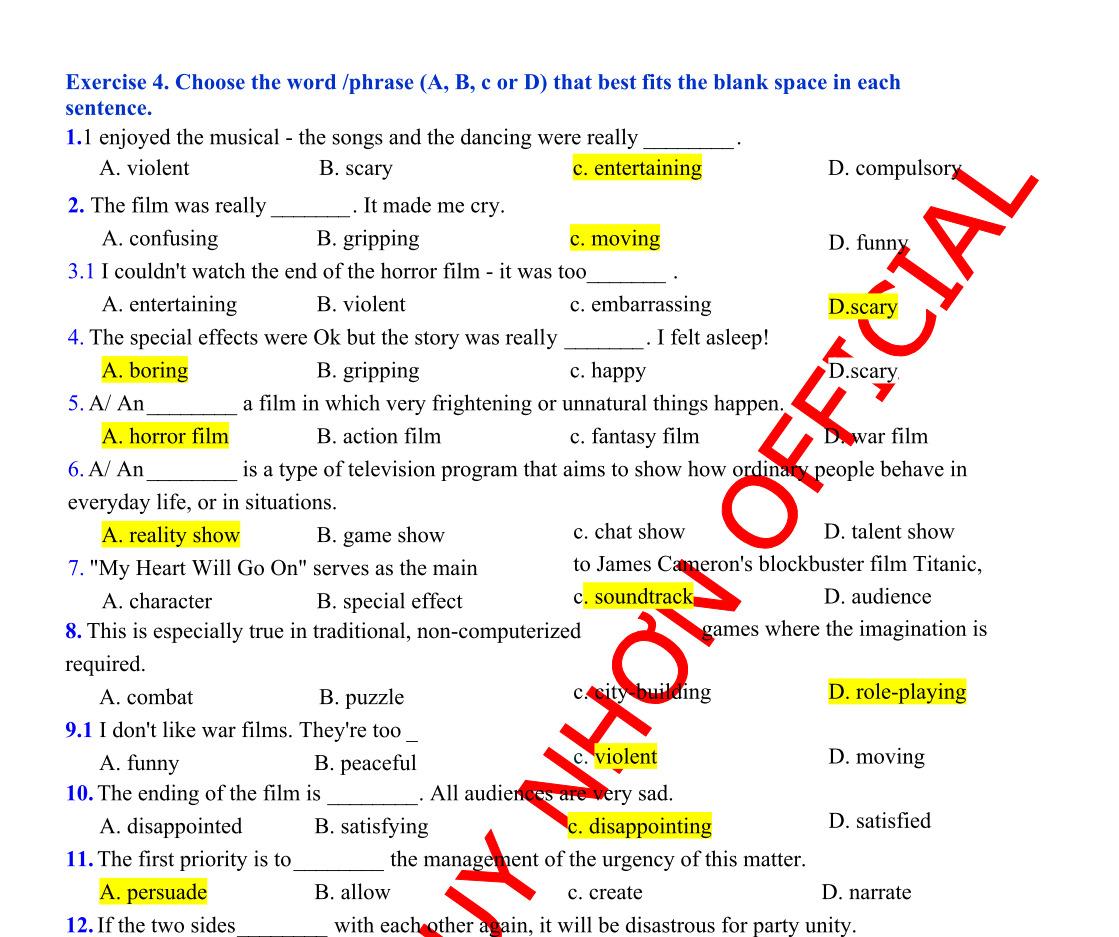





































































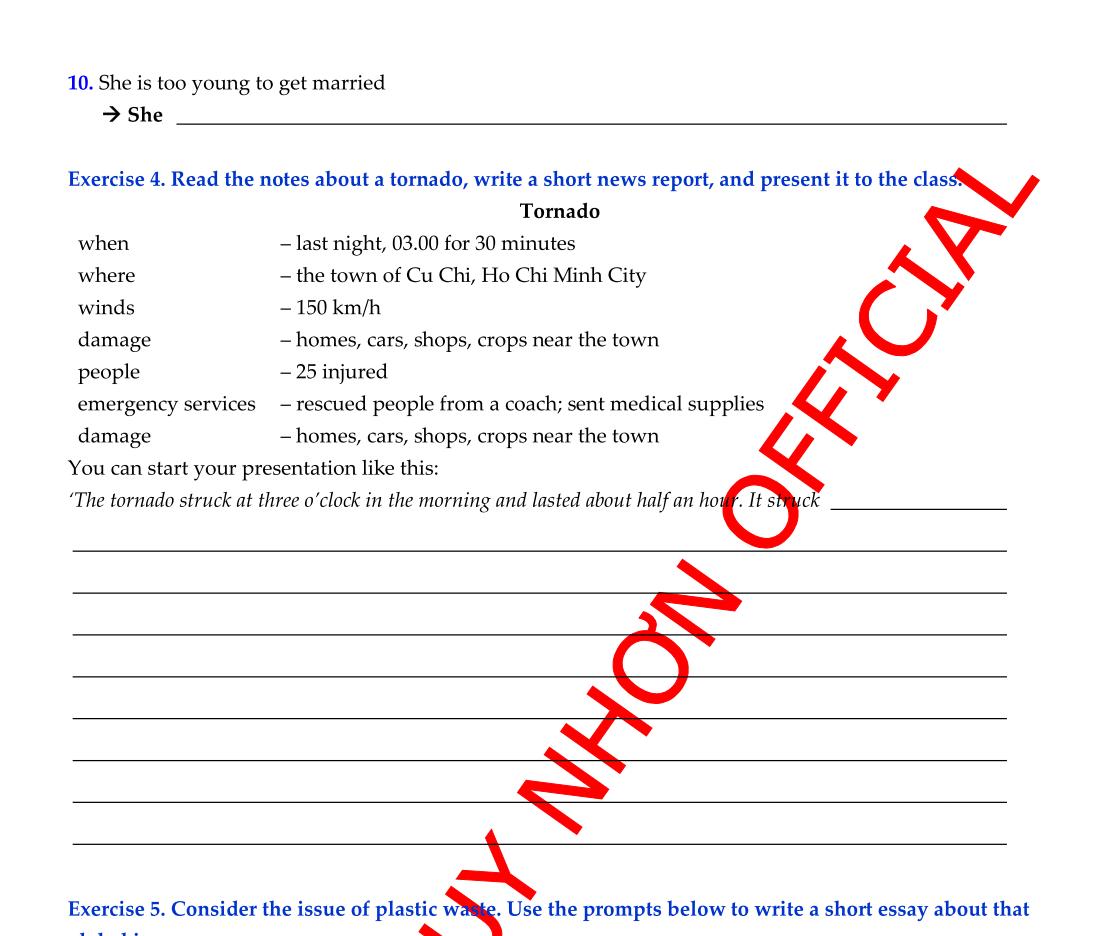


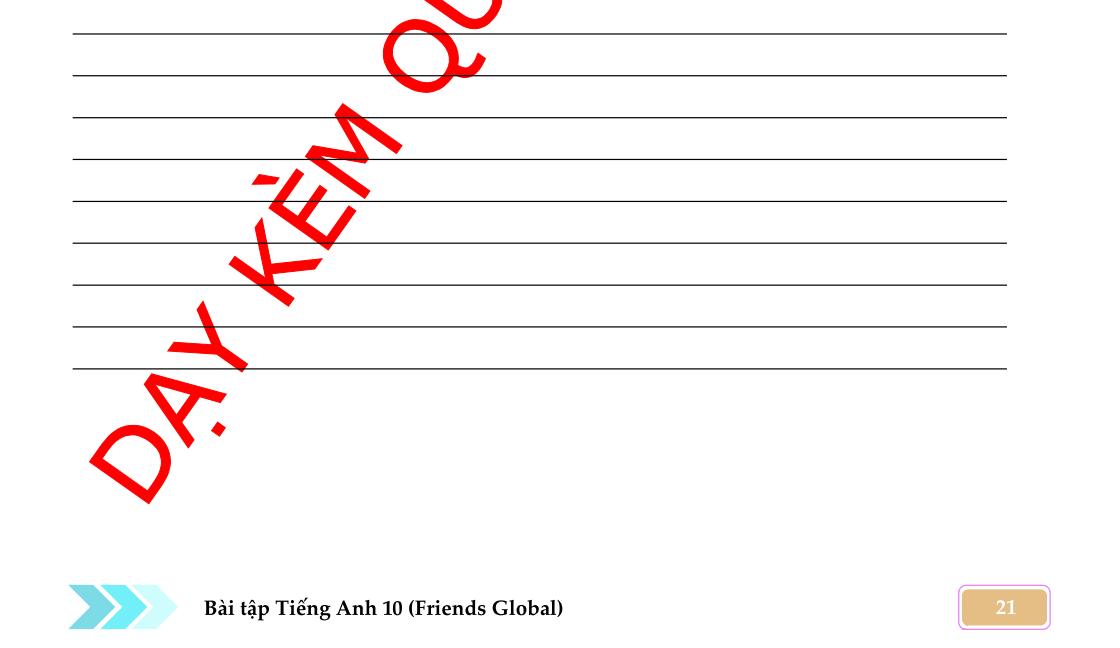
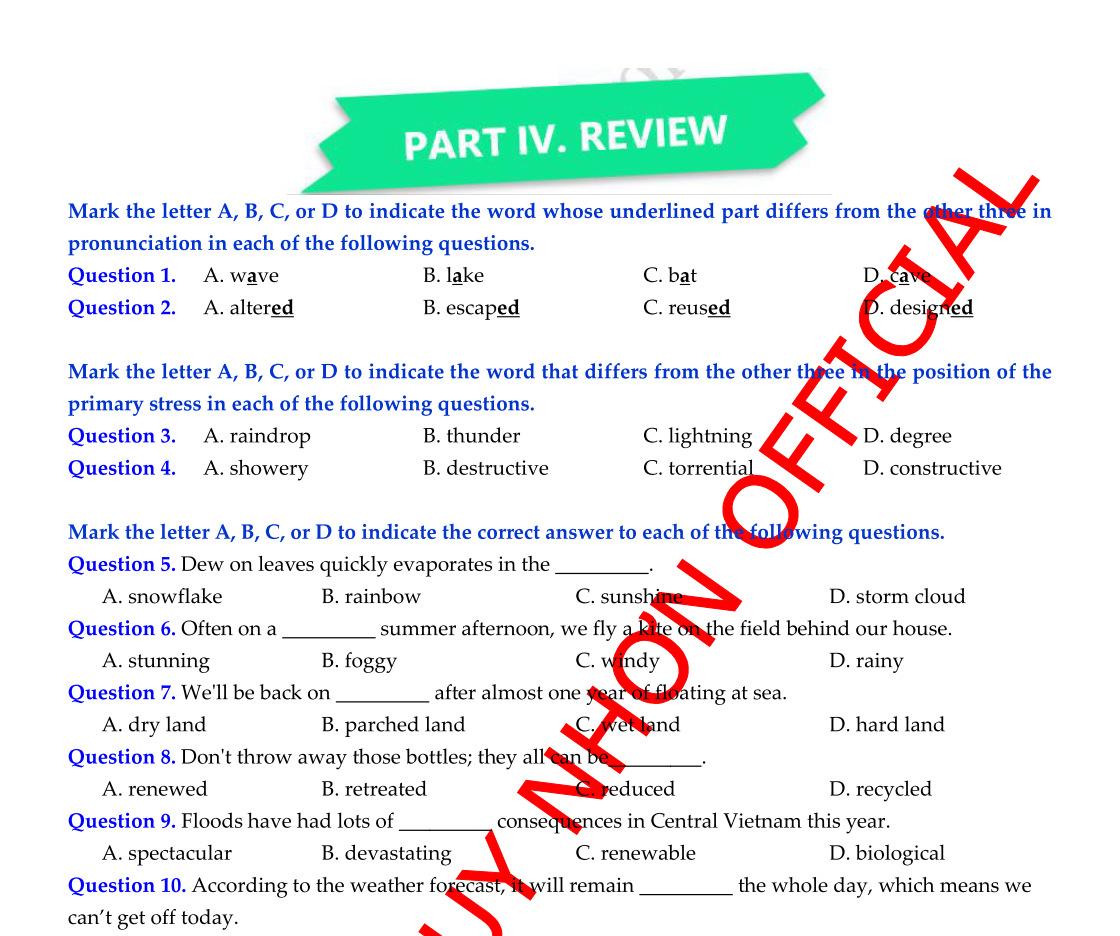






















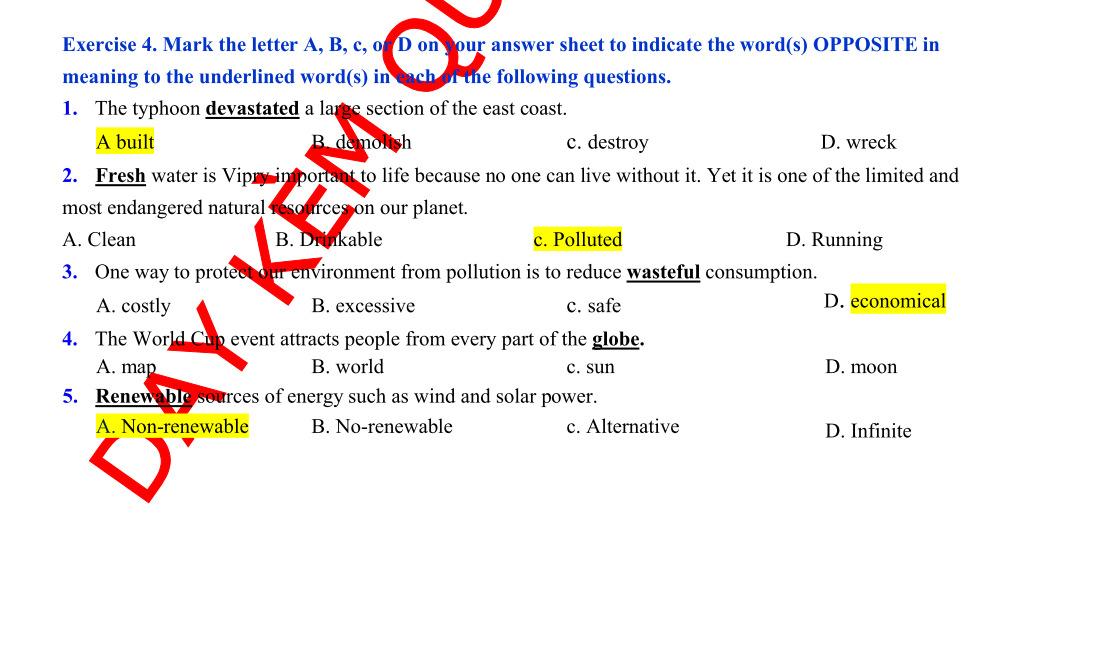



























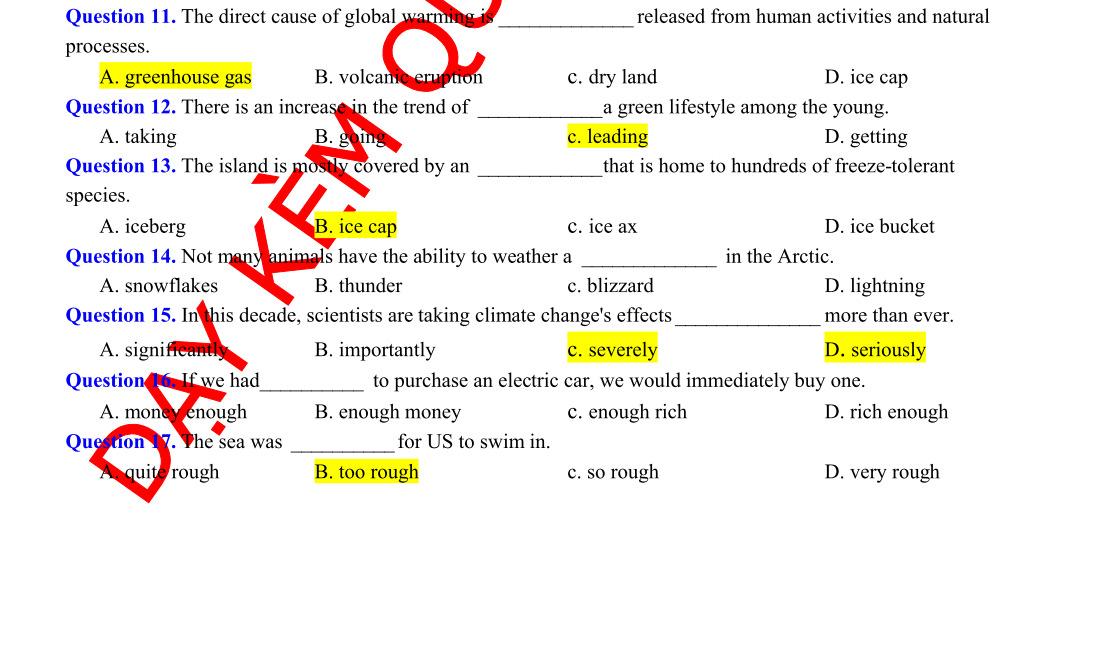

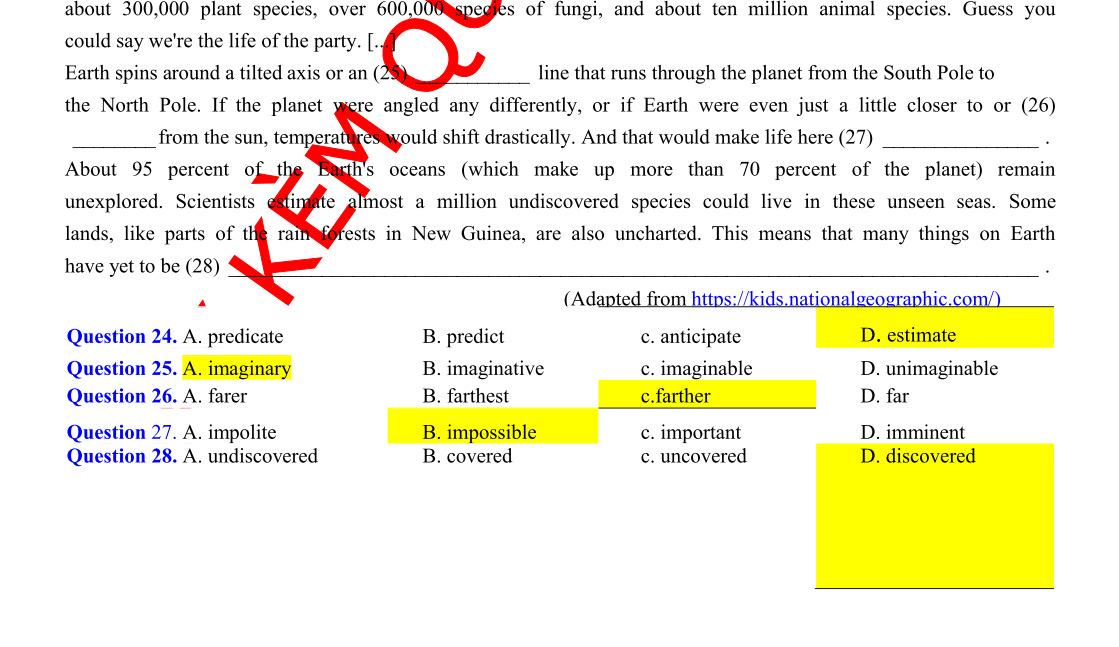








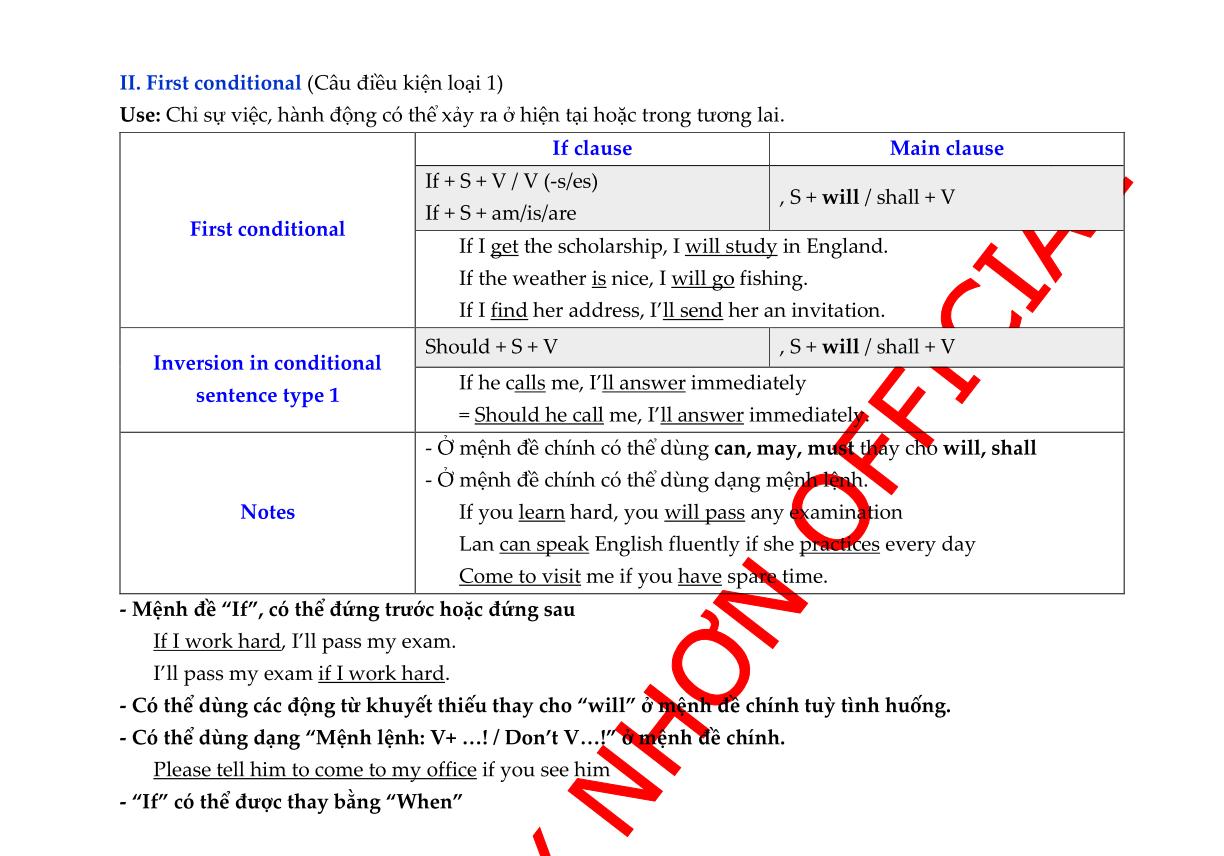



































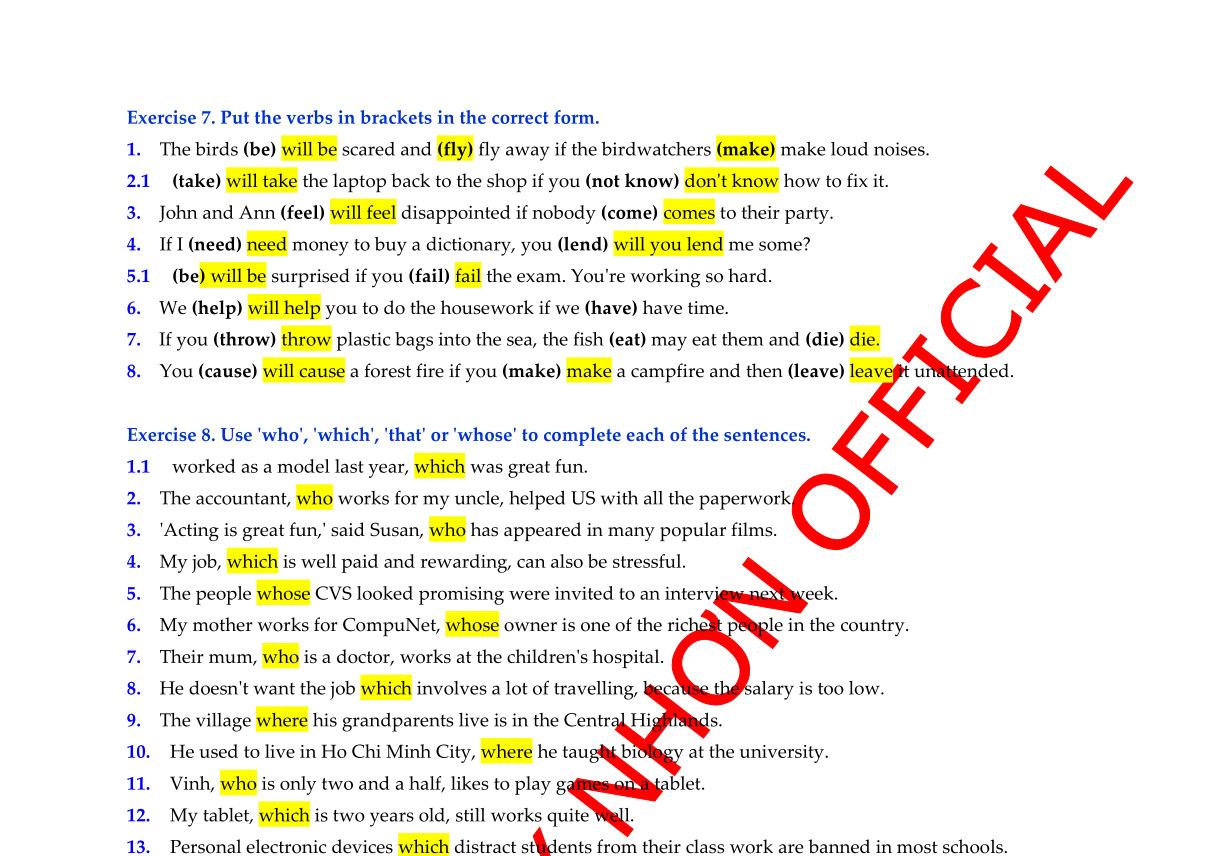


















































































































































































































































































































































































































































A.VOCABULARIES
Newwords (Từmới)
No. Word Type Pronunciation

1. butcher’s n /ˈbʊtʃə(r)z/ quầybánthịt
Meaning
2. charityshop n /ˈtʃærəti ʃɒp/ cửahàngtừthiện

3. clothesshop n /kləʊðz ʃɒp/ cửahàngquầnáo
4. cosmeticsstore n /kɒz ˈmetɪkstɔː(r)/ cửahàngmỹphẩm
5. deli n /ˈdeli/ cửahàngđặcsản,bánđồănngon
6. estateagent n /ɪˈsteɪteɪdʒənt/ nhânviênbấtđộngsản
7. florist’s n /ˈflɒrɪsts/ cửahàngbánhoa
8. greengrocer’s n /ˈɡriːnɡrəʊsə(r)z/ cửahàngbánraucủquả
9. jeweller’s n /ˈdʒuːələ(r)z/ cửahàngbánđồtrangsức
10. launderette n /ˌ lɔːndəˈret/ tiệmgiặtlà
11. newsagent’s n /ˈnjuːzeɪdʒənts/ cửahàngbánbáo
12. optician n /ɒp ˈtɪʃn/ chuyêngianhãnkhoa
13. stationer’s n /ˈsteɪʃənə(r)z/ cửahàngvănphòngphẩm
14. takeaway n /ˈteɪkəweɪ/ cửahàngbánđồmangđi
15. bargain n /ˈbɑːɡən/ giáhời,mónhời
16. coupon n /ˈkuːpɒn/ phiếu
17. discount n /ˈdɪskaʊnt/ giảmgiá
18. pricetag n /ˈ praɪstæɡ/ nhãnghigiá
19. receipt n /rɪˈsiːt/ hóađơn
20. refund n/v /ˈriːfʌnd/ tiềnhoànlại,hoàntiền
21. sale n /seɪl/ đợtgiảmgiá
22. specialoffer n /ˌspeʃl ˈɒfə(r)/ khuyếnmãiđặcbiệt
23. essentials n /ɪˈsenʃlz/ đồnhuyếuphẩm
24. equal adj /ˈiːkwəl/ côngbằng
25. afford
B.GRAMMARS
I.PASTPERFECT (Thìquákhứhoànthành)
PastPerfect (Quákhứhoànthành)
Côngthức
(+)
(-)
(?)
Cáchdùng
3/ed
3/ed ?
-Diễntả1hànhđộngxảyratrước1hànhđôngkháctrongquákhứ(hànhđộng xảyratrước dùng quákhứhoànthành,hànhđộng xảyrasau dùng quákhứđơn)
E.g: Afterhehadfinishedwork,hewenthome.
-Diễntả1hànhđộngxảyratrước1thờiđiểmtrongquákhứ.
E.g: Ihadgonetobedbefore10o'clocklastnight
Dấuhiệu
-before,after,already,just,when,assoonas,bythetime,until,bytheendof+time,by+time,
II.SECONDCONDITIONAL (Câuđiềukiệnloại2)
Use: Điềukiệnkhôngthểxảyraởhiệntại,tráivớithựctếởhiệntại.Đólàtínhhuốnggiảđịnh
Ifclause
Mainclause
Secondconditional
Inversioninconditional sentencetype2

If+S+V2/ed (were chotấtcảcácngôi) ,S+ would +V
IfIhadmoney,Iwouldbuythatcar. IfIwereyou,Iwouldn'tbehavelikethat.
Were+S+to-V ,S+ would +V
IfIlearntRussian,IwouldreadaRussianbook.
=WereItolearnRussian,IwouldreadaRussianbook
-Cóthểdùng might,could thaycho would IwouldtellyoutheanswerifIknewitmyself Ifshehadtime,shecouldgotothemovienow.
-Khidùngcâuđiềukiệnloại2này,ta phảihiểuýtráilại.
- “tobe” chia “were” chotấtcảcácngôi.
III.BAREINFINITIVE-TOINFINITIVE-GERUNDS (Độngtừnguyênmẫu,nguyênmẫucó“to”,danh độngtừ)
1.BAREINFINITIVE/INFINITIVESWITHOUT“TO” (Độngtừnguyênmẫukhôngcó“to”)
+ Đứngsau các độngtừkhuyết thiếu: can, could, should, may, might, will, shall, would, must...
E.g: Thischild can singafolksonginGerman.
+Đứngsau"had better","would rather/sooner"hay"rather than"
Chúngtasửdụngđộngtừ nguyênmẫukhôngcó"to"
khi
E.g: You'dbetterstudyharderinordertopasstheexam.
+Đứngsau"make':"let"Make/Let+O+V(bare-inf)
E.g: Anna letherdaughters playoutside.
+Đứngsaucácđộngtừchỉtrigiác, thểhiệnhànhđộngđãhoàntất hoặcbiếtđượctoànbộsựviệcđãxảy
ra: hear, smell, watch, notice, feel...
E.g: I heard someonescreamatmidnight.
Verb+toinfinitive (Độngtừtheosaolàto-V)
afford choose hope prepare want agree decide learn promise wish arrange expect manage refuse wouldlike ask fail need seem wouldlove help plan threaten hesitated
E.g: Asitlate,I decided totakeataxihome. Allcitizens agree tobuildawaterparkatthecenterofthecity.
Verb+Object+toinfinitive (Độngtừtheosaolàtânngữ+to-V) advise enable invite remind warn ask encourage need require wish allow forbid order teach wouldlike beg force permit tell expect help persuade want

E.g: He wouldlikeme tocome.
Thedoctor advisesme toeatmorevegetables.
Someformsusetheinfinitivewith“to” (Mộtsốdạngdùngđộngtừnguyênmẫucó“to”)
+Làmchủngữtrongcâu
E.g: Tobecomeateacherisherdream.
+Làmtânngữcủađộngtừ
E.g: It'sraining,soshedecidestobringanumbrella.
+Làmtânngữcủatínhtừ
E.g: I'mgladtoseeyouhere.
+Chỉmụcđích:
E.g: Isthereanythingtoeat?
+Dùngsaucáctừđểhỏi"wh-":who,what,when,how... nhưngthường khôngdùngsau"why"
E.g: Idon'tknow what todo.
+Đứngsaucáctừ'thefirst':"thesecond':"thelast,"theonly".
E.g: Namis thefirst personinmyclasstoreceivethescholarship.

1. Ittakes/took+O+thờigian+to+V-inf (Aiđómấtbaolâuđể.)
E.g: Ittookme2weekstofindasuitablejob.
2. S+be+adj+toV-inf
E.g: It'sinterestingtoplayvolleyballtogether.
3. S+V+too+adj/adv+to+Vela (quá...để.)
E.g: It'stoolatetosaygoodbye.
4. S+V+adj/adv+enough+to+V-inf (đủ....để.)
E.g: HespeaksEnglishwellenoughtocommunicatewithforeigners.
5. I+think/thought/believe/find+it+adj+to+V-inf (tôinghĩ...để.)


E.g: Ifinditdifficulttolearntoplaythepiano.
Verb+V_ing
admit delay keep quit understand advise deny mind recommend avoid discuss miss report can’thelp enjoy postpone risk consider finish practice suggest
+Làmchủngữtrongcâu
E.g: Doingexerciseregularlyisverygoodforourhealth.
+Làm tân ngữ đứng sau một số cụm từ: it's (not) worth, it's (no) use/ good, in addition to, can't help,can'tbear,can'tstand...
E.g: It'sworth buyinganexpensivetickettothisconcert.
+Đứngsaucáccụmđộngtừ(phrasalverbs):giveup,putoff,keepon, beopposedto,faceup,tobeagainst,lookforwardto,beinterestedin, be/getusedto,seeabout,carefor...
E.g: I getusedto gettingupearly.
Lưuý:Mộtsốđộngtừđivới2trườnghợp
stop+V-ing
stop+to-V
forget remember regret
forget remember regret
Dừnglàmgì(dừnghẳn)
E.g: He stopped smokingthreeyearsago.
Dừnglạiđểlàmviệcgì
E.g: He stopped tosmokeacigarette.
Quên/nhớ/hốitiếcđãlàmgì(ởquákhứ)- đãxảyrarồi
+V-ing +to-V
E.g: Sheremembers seeinghim.
Quên/nhớ/tiếcsẽphảilàmgì(ởhiệntại-tươnglai)
E.g: I regret toinformyouthatthetrainwascancelled.
Danhđộngtừthườngđược dùngđể
try+V-ing
Thửlàmgì
E.g: Youshould try wearingthishat.
Cốgắnglàmgì
try+to-V
prefer +toV+ ratherthan (V)
mean+V-ing
mean+to-V
need+V-ing
need+to-V
used+to-V
be/getusedto+V-ing
E.g: I try topasstheexam.
E.g: I prefer stayingathometogoingout.
I prefer tostayathome ratherthan goout.
Cónghĩalàgì.
E.g: Thissign means notgoinginto.
Cóýđịnhlàmgì.
E.g: Hedoesn't mean topreventyoufromdoingthat.
Cầnđượclàmgì(=needtobedone)
Yourhair needs cutting.(=Yourhairneedstobecut.)
Cầnlàmgì

E.g: I need tocleanthehouse.
Đãtừng/thườnglàmgìtrongquákhứ(bâygiờkhônglàmnữa)
E.g: I usedto getupearlywhenIwasyoung.
Quenvớiviệcgì(ởhiệntại)
E.g: I'mused togettingupearly.

Exercise1.Choosethewordthathastheunderlinedpartpronounceddifferentlyfromtherest.
Exercise2.Choosethewordineachgroupthathasthedifferentstressfromtherest.
Exercise1.Choosethecorrectverbinthesentences.
7. Buytwofor£100and sell/save £20!
8. CanI lend/borrow somemoneyfromyou?
9. Don'tforget,you borrow/owe me£50.
10. “Wheredidyoupay for/buy thatDVDplayer?”—“Attheelectricalstoreintown.”
Exercise2.Choosetheword/phrase(A,B,CorD)thatbestfitstheblankspaceineachsentence.
1. Yougeta_______ifyoubookmorethantentickets.
2. Inashop,the_______onanitemforsaleisasmallpieceofcardwiththepriceonit.
3. _______maybeabletofindsomegoodopportunitiesinbusinessthisyear.
4. This_______isfor15centsoffpapertowels.
5. Youcanbuyinsurancetoprotectyouagainstlossof_______

A.were/wouldhavebeen
C.hadbeen/wouldbe
B.were/wouldbe
D.was/was
Exercise3.MarktheletterA,B,C,orDonyouranswersheettoindicatetheword(s)CLOSESTinmeaning totheunderlinedword(s)ineachofthefollowingquestions.
1. Ican'tstandyouanymore.You spendmoneylikewater.
A.spendalotofmoneyunnecessarily
C.makemoneyinashorttime
B. earnalotofmoney
D.earnenoughmoney.
2. Theworldbankisaninternationalfinancialorganization founded in1944.
A.takeoff B.setup
3. It'smore economical tobuythiscarthanthatjetski.
A.cost-effective B.expensive
C.growup
C.insensitive
4. He’dbetterpaymebackthatmoneyhe owes mesoon.
A.borrows B.lends
C.gives
D.closedown
D.wasteful
D.refund
5. HehasjustbuyaCadillac.Idon’tknowhowheearnshislivingbutheseems tohavemoneytoburn.
A.toearnalotofmoney
C.tolendalotofmoney
B.tochargealotofmoney
Exercise 4. Mark the letter A, B, C, or D on your answer sheet to indicate the word(s) OPPOSITE in meaningtotheunderlinedword(s)ineachofthefollowingquestions.
1. Linhoften wastes moneyinbuyingclothesthatshejustwearsafewtimes.
2. Theyusuallygiveyoua discount ifyoubuymultiplecopies.
3. Aftershelostherjob,shebeganto runintodebt.
A.borrowing money B.owing money
C. beingoutofdebt D.nothavingenoughmoney
4. Thecostoftheprojecthas increased dramatically/significantlysinceitbegan. A.rose B.grew C.developed
5. Here’sthemoneyyou lent melastweek.Thankyou!
Exercise6.Givethecorrectformofthewords.
1. Its'goingtobedifficultforgovernmentsto_________________theaimstheyhavesetthemselves. (achievement)

2. WhenImeetmygoal,youwillmakesixtimesyouroriginal_________________. (invest)
3. Hisresearchhas_________________enormouslytoourunderstandingofthedisease. (contributory)
4. Villagehadastrongsignificanteffectonthenumberof_________________supportsources. (money)
5. Luckily,thereareseveralSuarezlooksthatare_________________priced. (reason)
6. Thecostofaroomatthehotel_________________withtheseason. (vary)
7. Ifyou'rewritingapersonal_________________letter,yourlanguagecanbequitesimilar. (donate)
8. Mr.Catlinatthebanksayshe'sas_________________astheycome. (honesty)
Exercise7.Completethesecondconditionalsentenceswiththecorrectformoftheverbsinbrackets.
1. Ifthey_____________ (live) inthecity,life_____________ (be) easier.
2. I_____________ (play) basketballifI_____________ (be) taller.
3. Ifwe_____________ (build) smallerhouses,wewoulduselessenergy.
4. IfI_____________ (find) moneyinthestreets,I_____________ (take) ittothepolice.
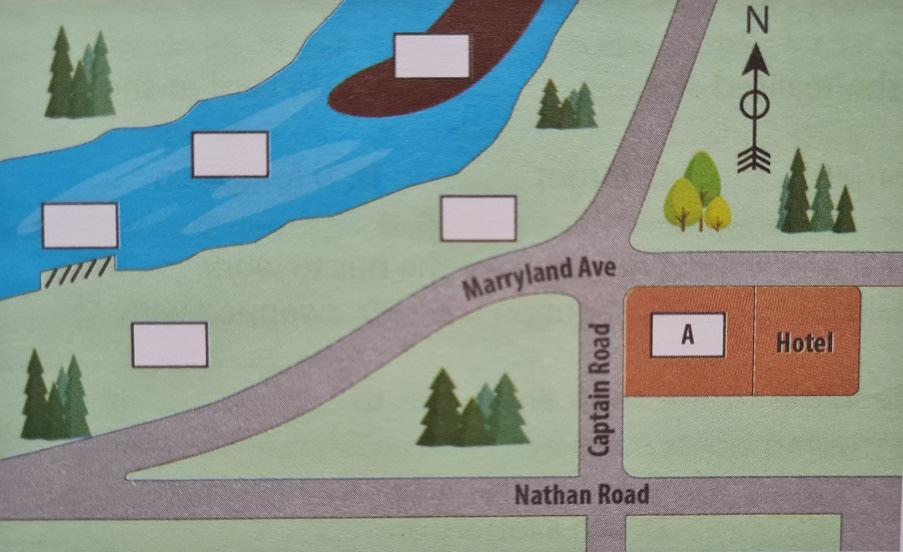


5. Ifwe_____________ (have) aDVDplayer,we_____________ (watch) filmseveryevening.
Exercise8.Completethesentenceswiththecorrectformoftheverbsinbrackets.
1. Mybrothercan'tstand_____________ (listen)to rapmusic.
2. Jackdoesn'twant_____________ (go) totheconcerttonight.
3. He'ssokind.Heoffered_____________ (help) mewithmyhomework.
4. Doyoufancy_____________ (goout) thisevening?
5. Whentheywenttothecinema,hepretended_____________ (be) eighteen.
6. Hemademe_____________ (do) italloveragain.
7. Icouldn't_____________ (remember) hisaddress.
8. Theywon'tletus_____________ (leave) theCustomsuntilourluggagehasbeenexamined.
9. Pleaseletme_____________ (know) yourdecisionassoonaspossible.
10. Youneedn't_____________ (ask) forpermission;youcan_____________ (use) itwheneveryoulike.
Exercise9.Completethesentences.Usethepastperfectformoftheverbsinbrackets.
1. BythetimeIarrivedatthecinema,thefilm_____________ (finish).
2. Myparents_____________ (notwatch) thefilmbefore,sotheyboughttheDVD.
3. ___________________ (Peter/phone) beforeyouleftthehouse?
4. WhenIlookedinmybag,IrealisedthatI_____________ (leave) myphoneonthebus.
5. Whenthefiremenarrived,thefire___________________ (already/burn) downthewarehouse.
Exercise1.Youwillhearamessagedescribingamap.Listenandfindplaces.WritealetterA-Finthe box.Thefirstonehasbeendoneforyouasanexample. 33
A. Departmentstore
B. Sailor’sClub
C. Touristship
D. Monkeyisland
E. Dredgingboat
F. Restaurant
Exercise2.Listenagainanddecideifthestatementsaretrueorfalse.WriteTrueorFalseineachblank.
34
1. Thereisanislandinthemiddleoftheriver.
2. Thereisaparknexttotherestaurant.
3. YoucangototheSailor’sClubonSundaynights.
4. Thedredgingboatisworkingnotfarfromtheisland
5. Thetouristshipreceivesthousandsofguestsaday.
Exercise1.Lookatthephotos.StudentAdescribesthefirstpicturewhilestudentBdescribesthesecond one,andthenpresentthereasonswhyschoolsshould investmoremoneyonthem,usingtheuseful languageandthepromptsbelow.
The first photo shows …
The second photo shows …
Both photos show …
The facilities in … help students …
They both help …
Our school should …
-thefirstphoto/aschoolcanteen
-students/havinglunch/theirteacher
-secondphoto/schoolgym
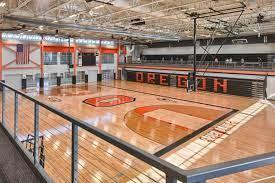
-bothphotos/theschoolfacilities
-firstphoto/thestudents/nothavinglessons/while/secondphoto/thefacilities/PElessons
-facilities/thecanteen/students/enjoy/theirlunch/theatmosphere
-facilities/thegym/students/getbetterresults/PElessons
-canteen/gymboth/helpimprove/health/students


-ourschool/spendmoremoney/upgradebothofthem


Exercise1.ReadthefollowingpassageandmarktheletterA,B,C,orDonyouranswersheettoindicate thecorrectwordorphrasethatbestfitseachofthenumberedblanksfrom1to5
When youfirst arrivein a foreign culture, often your first reaction iscompletely positive . Everything seems exciting, different and fascinating. It’s an (1)_______. If you are just ona short holiday, you will probablyneverleavethisphase.
(2)_______,ifyoustaylonger,yourattitudecanstarttochange.Asyoustarttorealize(3)_______little youreallyunderstandthenewculture,lifecangetfrustrating.Peoplemisunderstandwhatyouaretrying to say, or they may laugh at you when you say something incorrectly. Even simplethings,likepostinga letter,canseemverydifficulttoyou.Thus,youarelikelytogetangryorupsetwhenthingsgowrong.
Withtime,though,youstartto(4)_______ tobecomemorecomfortablewiththedifferencesandbetter abletohandlefrustratingsituations.Your(5)_______ofhumorreappears.Finally,youmayfeelenthusiastic aboutthecultureonceagain,enjoylivinginit,andevenprefercertainaspectsoftheculturetoyourown.
(Adapted from Navigate – Course book, OUP 2015)
Exercise2.ReadthefollowingpassageandmarktheletterA,B,C,orDonyouranswersheettochoose thewordorphrasethatbestfitseachofthenumberedblanksfrom1to5.
Afterinventingdynamite,Swedish-bornAlfredNobelbecameaveryrichman.However,he foresaw its universallydestructivepowerstoolate.Nobelpreferrednottoberememberedastheinventorofdynamite, soin1895,justtwoweeksbefore hisdeath·,hecreatedafundtobeusedforawardingprizestopeoplewho had madeworthwhile contributions to humanity. Originally there were five awards: literature, physics, chemistry,medicine,andpeace.Economicswasaddedin1968,justsixtysevenyearsafterthefirstawards ceremony.
Nobel'soriginallegacyofninemilliondollarswasinvested,andtheinterestonthissumisusedforthe awardswhichvaryfrom$30,000to$125,000.
Every year on December 10, the anniversary of Nobel's death, the awards (gold medal, illuminated diploma,andmoney)arepresentedtothewinners.Sometimespoliticsplaysanimportantroleinthejudges' decisions.Americanshavewonnumerousscience awards,butrelativelyfew literature prizes.Noawards werepresentedfrom1940to1942atthebeginningofWorldWar11.Somepeoplehavewontwoprizes,but thisisrare;othershavesharedtheirprizes.
1. Theword“foresaw”inthefirstparagraphisnearestinmeaningto
2. TheNobelprizewasestablishedinorderto_______.
A.recognizeworthwhilecontributions tohumanity
B.resolvepoliticaldifferences
C. honorthe inventorofdynamite
D.spendmoney
3. InwhichareahaveAmericansreceivedthemostawards?
4. Allofthefollowingstatementsare true EXCEPT_______.

A.Awardsvaryinmonetaryvalue
B.CeremoniesareheldonDecember10tocommemorateNobel'sinvention
C.Politicsplaysanimportantroleinselectingthewinners
D.Afewindividualshavewontwoawards
5. Whatisthemainideaofthispassage?
A.AlfredNobelbecameveryrichwhenheinventeddynamite.
B.AlfredNobelcreatedawardsinsixcategoriesforcontributionstohumanity.

C.AlfredNobelleftallofhismoneytoscience
D.AlfredNobelmadealastingcontributiontohumanity
Exercise1.Writesecondconditionalsentencesforthesesituations.
Exercise1.Writesecondconditionalsentencesforthesesituations.
1. Idon'thaveacomputer,soIdon'tplaycomputergames.
2. BenhastogetupearlyonMondays,sohedoesn'tgooutonSundayevenings.
3. Ihavealotofhomework,soI'llstayinthisevening.
4. Wedon'thavetohelpwiththecooking,sowecanwatchaDVD.
5. Thereisn'tafootballmatchonTVthisevening,sothey'regoingout.
6. Janedoesn'thaveaticketfortheconcert,sosheisn'tgoing.
7. Idon'tdrivetooclosetotheanimalsonsafari.Theydon'tgetscared.
8. Tomdoesn'thaveapassport.Hecan'ttravelabroad.
9. Therearesomanytouristsvisitingthenationalparks.Theenvironmentthereisbadlydamaged.
10. Touriststhrowlitterintheriver.Thewaterispolluted.
Exercise2.Rewritethesentencesbelowwiththesamemeaning.
1. Mybrotherwentout.Iarrivedhome.
When
2. Iwenttobed.Nickphoned.
When
3. Theshoplifterranaway.Thepolicearrived.
When
4. Thetrainleft.Wegottothestation.
When ______________________________________________________________________________
5. Itstartedtorain.Weleftthebeach.(Wewerelucky.)
When ______________________________________________________________________________
6. Dadcookeddinner.Mumgothome.
7. Thefilmstarted.Wearrivedatthecinema.
8. Nickboughtsomegreetingcards.Herememberedthathehadmanyathome.
9. Thethiefescapedbeforethepolicearrived.
10. First,hebookedtherestaurant,andthenheinvitedeverybody.
Exercise3.Rewritethefollowingsentenceswithoutchangingtheirmeaning,usingthegivenwords.
1. "Bringmeacupoftea,please,"shesaidtohim.
2. Thereisnopointinpersuadinghimtochangehismind.
3. ThisisthefirsttimeIhavespokeninfrontofsomanypeople.
4. Myfatherletthechildrensplasharoundinthepoolforawhileyesterday.
5. It'snousetryingtomakefriendswithhim.
6. Ipreferhavingdinnerathometogoingoutfordinner.
7. Hewishedhehadinvitedhertohisbirthdayparty.
8. YoucantrytogetJimtolendyouhiscar,butyouwon'tsucceed.
9. Sheispleasedtomeethergrandmaagain.
10. Whydon’tyouputyourluggageundertheseat?
Exercise4.Readtheparagraphsofanopinionessay.Puttheparagraphsinthecorrectorderand completethegapswiththephrasesbelow.
1- ____________________,moneyisobviouslynecessaryintoday’sworld.Itisverydifficult tobehappyifyoudonothaveenoughmoneyforthingslikeholidays. 2____________________,tomyminditisstillpossibletobehappyandrelativelypoor,aslong asyouhaveenoughtobuyfoodandclothing.
3- ____________________,Iwouldsaythatmoneycanimprovethelivesofpeoplewhodo nothaveenoughtolivecomfortably.However,moneyaloneisnotenoughtobring happiness;loveandfriendshiparefarmoreimportant.

Inmostpartsofthedevelopedworld,peoplearerichertodaythantheywerefiftyyearsago. Buthasmoneymadethemhappier?Thisisthequestionweneedtoanswer.
4- ____________________thatmoneyisnotthemostimportantthinginmostpeople’slives. Theyregardfriendsandfamilyasmoreimportant. 5- ____________________,ifyouare feelingmiserableaboutafriendshipthathadended,moneycannothelpyou.
6- ____________________,itseemstomethatrichpeopleareoftentheunhappiest.Ifmoney reallycouldbuyhappiness,therichwouldbethehappiestpeopleintheworld.Judgingby thestoriesabouttheminmagazinesandonTV,theyclearlyarenot.

4- New words (Từ mới)
No. Word Type Pronunciation Meaning
1. butcher's n /butfa(r)z/ quầy bán thịt
2. charity shop n /'tfaeratijbp/ cửa hàng từ thiện
3. clothes shop n /klauỗzjbp/ cửa hàng quần áo
4. cosmetics store n /koz'metik stor(r)/ cửa hàng mỹ phẩm
5. deli n /'deli/ cửa hàng đặc sản, bán đồ ăn ngon
6. estate agent n /i'steit eidjant/ nhân viên bất động sản
7. florist's n /'florists/ cửa hàng bán hoa
8. greengrocer's n /'gri:ngrausa(r)z/ cửa hàng bán rau củ quả
9. jeweller's n /'dju:ala(r)z/ cửa hàng bán đồ trang sức
10. launderette n /,lo:nda'ret/ tiệm giặt là
11. newsagent's n /'nju:zeidjants/ cửa hàng bán báo
12. optician n /op'tijh/ chuyên gia nhãn khoa
13. stationer's n /' steijana(r)z/ cửa hàng văn phòng phẩm
14. takeaway n /'teikawei/ cửa hàng bán đồ mang đi
15. bargain n /'ba:gan/ giá hòi, món hòi
16. coupon n /'ku:pnn/ phiếu
17. discount n /diskaunt/ giảm giá
18. price tag n /'prais taeg/ nhãn ghi giá
19. receipt n /n'si:t/ hóa đơn
20. refund n/v /'riiÍAnd/ tiền hoàn lại, hoàn tiền
21. sale n /seil/ đợt giảm giá
22. special offer n /.spejl 'ofa(r)/ khuyến mãi đặc biệt
23. essentials n /fsenjlz/ đồ nhu yếu phẩm
24. equal adj /'i:kwal/ công bằng
25. afford V /a'fo:d/ có khả năng chi trả
26. charge V /tfa:dj/ tính phí
27. owe V /au/ nợ
28. luxury adj /'Rkfari/ xa xỉ
29. income n /'inkvm/ thu nhập
30. funding n /' ÍAndin/ nguồn tiền, nguồn quỹ
31. investor n /in'vesta(r)/ nhà đầu tư
32. risk V /nsk/ mạo hiêm
33. entrepreneur n /Dntrapra'n3:(r)/ doanh nhân
34. contract n /'knntraekt/ hợp đồng
35. profit n /'profit/ lọi nhuận
36. low-income adj /lau-'ink \m/ thu nhập thấp
37. earn V /3:n/ kiếm được
38. pocket money n /'pnkit mAni/ khoản tiền tiêu vặt
I. PAST PERFECT (Thì quá khứ hoàn thành)
Past Perfect (Quá khứ hoàn thành)
Công thức
(+) s + had + Vs/ed
(-) s + had not + Vs/ed
(?) Had + s + Vs/ed ?
Cách dùng
- Diễn tả 1 hành động xảy ra trước 1 hành đông khác trong quá khứ (hành động xảy ra trước dùng
quá khứ hoàn thành, hành động xảy ra sau dùng quá khứ đơn)
E.g: After he had finished work, he went home.
- Diễn tả 1 hành động xảy ra trước 1 thời điểm trong quá khứ.
E.g: I had gone to bed before 10 o'clock last night
Dấu hiệu
- before, after, already, just, when, as soon as, by the time, until, by the end of + time, by + time, ...
II. SECOND CONDITIONAL (Câu điều kiện loại 2)
Use: Điều kiện không thể xảy ra ở hiện tại, trái với thực tế ở hiện tại. Đó là tính huống giả định
If clause
Main clause
Second conditional
Inversion in conditional sentence type 2
If + s + V2/ed
(were cho tất cả các ngôi) , s + would + V
If I had money, I would buy that car.
If I were you, I wouldn't behave like that.
Were + s + to-V , s + would + V
If I learnt Russian, I would read a Russian book.
= Were I to learn Russian, I would read a Russian book
- Có thể dùng might, could thay cho would I would tell you the answer if I knew it myself
Notes
If she had time, she could go to the movie now.
- Khi dùng câu điều kiện loại 2 này, ta phải hiên ý trải lại.
- "to be" chia "were" cho tất cả các ngôi.
III. BARE INFINITIVE - TO INFINITIVE - GERUNDS (Động từ nguyên mẫu, nguyên mẫu có "to", danh động từ)
1. BARE INFINITIVE/ INFINITIVES WITHOUT "TO" (Động từ nguyên mẫu không có "to")
+ Đứng sau các động từ khuyết thiếu: can, could, should, may, might, will, shall, would, must...
E.g: This child can sing a folk song in German.
+ Đứng sau "had better”,''would rather/sooner" hay "rather than”
Chúng ta sử dụng động từ nguyên mẫu không có "to"
khi
2.
E.g: You'd better study harder in order to pass the exam.
+ Đứng sau "make': "let" Make/ Let + o + V (bare -inf)
E.g: Anna let her daughters play outside.
+ Đứng sau các động từ chỉ tri giác, thể hiện hành động đã hoàn tất hoặc biết được toàn bộ sự việc đã xảy
ra: hear, smell, watch, notice, feel...
E.g: I heard someone scream at midnight.
- Verb + to iníinitivel (Động từ theo sao là to-V)
afford choose hope prepare want agree decide learn promise wish
arrange expect manage refuse would like ask fail need seem would love help plan threaten hesitated
E.g: As it late, I decided to take a taxi home.
TO - INFINITIVE (Động từ nguyên mẫu có "to")All citizens agree to build a water park at the center of the city.
Verb + Object + to infinitive! (Động từ theo sao là tân ngữ + to-V) advise enable invite remind warn ask encourage need require wish allow forbid order teach would like beg force permit tell expect help persuade want
E.g: He would like me to come.
The doctor advises me to eat more vegetables.
4- Some forms use the infinitive with "to"
(Một số dạng dùng động từ nguyên mẫu có "to")
+ Làm chủ ngữ trong câu
E.g: To become a teacher is her dream.
+ Làm tân ngữ của động từ
E.g: It's raining, so she decides to bring an umbrella.
+ Làm tân ngữ của tính từ
Động từ nguyên mẫu có "to" được dùng đê
E.g: I'm glad to see you here.
+ Chỉ mục đích:
E.g: Is there anything to eat?
+ Dùng sau các từ đê hỏi "wh-": who, what, when, how... nhưng thường không dùng sau "why"
E.g: I don't know what to do.
+ Đứng sau các từ 'the first': "the second': "the last, "the only".
E.g: Nam is the first person in my class to receive the scholarship.
4- Other structures (Một số cấu trúc khác)
1. It takes/took + o + thời gian + to + V-inf (Ai đó mất bao lâu để.)
E.g: It took me 2 weeks to find a suitable job.
2. s + be + adj + to V-inf
E.g: It's interesting to play volleyball together.
3. s + V + too + adj/adv + to + Vela (quá...để.)
E.g: It's too late to say goodbye.
4. s + V + adj/adv + enough + to + V-inf (đủ ....để.)
E.g: He speaks English well enough to communicate with foreigners.
5. I + think/ thought/ believe/ find + it + adj + to + V-inf (tôi nghĩ...để.)
E.g: I find it difficult to learn to play the piano.
4- Verb + v_ing
admit delay keep quit understand advise deny mind recommend avoid discuss miss report can't help enjoy postpone risk consider finish practice suggest
Danh động từ thường được
+ Làm chủ ngữ trong câu
3. GERUNDS (Danh động từ)dùng đê
E.g: Doing exercise regularly is very good for our health.
+ Làm tân ngữ đứng sau một số cụm từ: it's (not) worth, it's (no) use/ good, in addition to, can't help, can't bear, can't stand ...
E.g: It's worth buying an expensive ticket to this concert.
+ Đứng sau các cụm động từ (phrasal verbs): give up, put off, keep on, be opposed to, face up, to be against, look forward to, be interested in, be/get used to, see about, care for...
E.g: I get used to getting up early.
Lưu ý: Một sô động từ đi với 2 trường hợp
stop + V-ing
stop + to-V
forget remember Ị- + V-ing J
regret
forget remember >- + to-V
regret
Dừng làm gì (dừng hẳn)
E.g: He stopped smoking three years ago.
Dừng lại để làm việc gì
E.g: He stopped to smoke a cigarette.
Quên/ nhớ/ hối tiếc đã làm gì (ở quá khứ) - đã xảy ra rồi
E.g: She remembers seeing him.
Quên/ nhớ/ tiếc sẽ phải làm gì (ở hiện tại - tương lai)
E.g: I regret to inform you that the train was cancelled.
Thử làm gì
try + V-ing
try + to-V
prefer + to V + rather than (V)
mean + V-ing
mean + to-V
need + V-ing
need + to-V
used + to-V
be/ get used to + V-ing
E.g: You should try wearing this hat.
Cố gắng làm gì
E.g: I try to pass the exam.
E.g: I prefer staying at home to going out. I prefer to stay at home rather than go out.
Có nghĩa là gì.
E.g: This sign means not going into.
Có ý định làm gì.
E.g: He doesn't mean to prevent you from doing that.
Cần được làm gì (= need to be done)
Your hair needs cutting. (= Your hair needs to be cut.)
Cần làm gì
E.g: I need to clean the house.
Đã từng/ thường làm gì trong quá khứ (bây giờ không làm nữa)
E.g: I used to get up early when I was young.
Quen vói việc gì (ở hiện tại)
E.g: I'm used to getting up early.
Exercise 1. Choose the word that has the underlined part pronounced differently from the rest.
1.
Exercise 2. Choose the word in each group that has the different stress from the rest. 1.
Exercise 1. Choose the correct verb in the sentences.
1. I can't pay for / lafford £20.
2. How much do you want to cost / spend?
3. Can you lend / borrow me £5 to buy this magazine?
4. We charge / cost £6 for replacing watch batteries.
5. Do you sell |/ spend birthday cakes?
6. How much does it cost / charge?
7. Buy two for £100 and sell / save £20!
8. Can I lend / borrow some money from you?
9. Don't forget, you borrow /owe me £50.
10. "Where did you pay for / buy that DVD player?" — "At the electrical store in town."
Exercise 2. Choose the word /phrase (A, B, c or D) that best fits the blank space in each sentence.
1. You get a_______ if you book more than ten tickets. A. coupons
B. discount c. refund
2. In a shop, the_________ on an item for sale is a small piece of card with the price on it. A.code B.receipt
price tag
3. _______ may be able to find some good opportunities in business this year.
A. Entrepreneur B. Salaries c. Profits D. Investors
4. This________ is for 15 cents off paper towels. A.receipt
B. flower
c. coupon D. jewellery
5. You can buy insurance to protect you against loss of ______ if you are ill.
A. millionaire B. income
6. When Dad ________ the gardening, he watched TV.
A. did B. had done
7. After we had played football, we a shower.
A. have B. had had
8. After I________ the letter, I posted it.
A. writes B. wrote
c. funding D. contract
c. does D. has done
c. have had D. had
c. have written D. had written
9. I________lunch because I hadn't bought any food. A. didn't have B. doesn't have c. won't have D. don't have
10. when you left the office?
A. Jane had arrived B. had arrived Jane
c. Had Jane arrived D. Jane arrived had
11. A correction pen is used for __________your writing mistakes.
A. cover B. covered c. to cover D. covering
12. It's no good ________ him the truth now.
A. telling B. tell c. not to tell
13.I don't mind you home if you are tired.
A. drives B. driving c. drive
14.I remember _________ him in London.
A. meet B. to meet c. to meeting
15. Please don't forget _ ______ the baby. She needs to eat every two hours.
A. feeding B. fed
16. We let our son______ _____ up late at weekend.
to feed
A. staying B. stay c. to stay
17. Nam is very humorous. His ioke makes me a lot.
to tell
to drive
meeting
to be fed
stayed
laughed 18. If she________ him, she would be very happy. A. met B. will meet
A. laughing B. to laugh c. laugh
should meet 19. If I had enough money, I abroad to improve mv English.
is meeting
A. will go B. would go c. should go
20. If Tom________ here, he_________able to advise US.
A. were/ would have been B. were I would be
c. had been / would be D. was / was
should have to go
Exercise 3. Mark the letter A, B, c, or D on your answer sheet to indicate the word(s) CLOSEST in meaning to the underlined word(s) in each of the following questions.
1.I can't stand you anymore. You spend money like water.
A. spend a lot of money unnecessarily
c. make money in a short time
B. earn a lot of money
D. earn enough money.
2. The world bank is an international financial organization founded in 1944.
A. take off B. set up
3. It's more economical to buy this car than that jet ski.
A. cost-effective
B. expensive
4. He'd better pay me back that money he owes me soon.
A. borrows B. lends
c. grow up
c. insensitive
c. gives
D. close down
D. wasteful
D. refund
5. He has just buy a Cadillac. I don't know how he earns his living but he seems to have money to burn.
A. to earn a lot of money
c. to lend a lot of money
B. to charge a lot of money
D. to spend a lot of money
Exercise 4. Mark the letter A, B, c, or D on your answer sheet to indicate the word(s) OPPOSITE in meaning to the underlined word(s) in each of the following questions.
1. Linh often wastes money in buying clothes that she just wears a few times.
A. spends B. pays
c.saves
2. They usually give you a discount if you buy multiple copies.
A. reduction
B. decrease
c. deduction
D. makes
D. surcharge
3. After she lost her job, she began to run into debt
A. borrowing money
B. owing money
D. not having enough money
c. being out of debt
4. The cost of the project has increased dramatically/significantly since it began.
A. rose B. grew c. developed
5. Here's the money you lent me last week. Thank you!
A. afforded B. received c. owed
Exercise 6. Give the correct form of the words.
D. reduced
D. wasted
1. Its' going to be difficult for governments to achieve the aims they have set themselves, (achievement)
2. When I meet my goal, you will make six times your original investment. (invest)
3. His research has contributed enormously to our understanding of the disease. (contributory)
4. Village had a strong significant effect on the number of monetary support sources. (money)
5. Luckily, there are several Suarez looks that are reasonably priced. (reason)
6. The cost of a room at the hotel varies with the season. (vary)
7. If you're writing a personal donation letter, your language can be quite similar. (donate)
8. Mr. Catlin at the bank says he's as honest as they come (honesty)
Exercise 7. Complete the second conditional sentences with the correct form of the verbs in brackets.
1. If they lived (live) in the city, life would be (be) easier.
2.1 I would play (play) basketball if I were (be) taller.
3. If we built (build) smaller houses, we would use less energy.
4. If I found (find) money in the streets, I would take (take) it to the police.
5. If we had (have) a DVD player, we would watch (watch) films every evening.
Exercise 8. Complete the sentences with the correct form of the verbs in brackets.
1. My brother can't stand listening (listen) to rap music.
2. Jack doesn't want to go (go) to the concert tonight.
3. He's so kind. He offered to help (help) me with my homework.
4. Do you fancy going out (go out) this evening?
5. When they went to the cinema, he pretended to be (be) eighteen.
6. He made me do (do) it all over again.
7.1 couldn't remember (remember) his address.
8. They won't let US leave (leave) the Customs until our luggage has been examined.
9. Please let me know (know) your decision as soon as possible.
10. You needn't ask (ask) for permission; you can use (use) it whenever you like.
Exercise 9. Complete the sentences. Use the past perfect form of the verbs in brackets.
1. By the time I arrived at the cinema, the film had finished (finish).
2. My parents hadn't watched (not watch) the film before, so they bought the DVD.
3. Had Peter phoned (Peter / phone) before you left the house?
4. When I looked in my bag, I realised that I had left (leave) my phone on the bus.
5. When the firemen arrived, the fire had already burned (already / burn) down the warehouse.
Exercise 1. You will hear a message describing a map. Listen and find places. Write a letter A-F in the box. The first one has been done for you as an example, » 33
A. Department store
B. Sailor's Club
c. Tourist ship
D. Monkey island
E. Dredging boat
F. Restaurant
Exercise 2. Listen again and decide if the statements are true or false. Write True or False in each blank. 34
1. There is an island in the middle of the river. True
2. There is a park next to the restaurant. False

3. You can go to the Sailor's Club on Sunday nights. False
4. The dredging boat is working not far from the island True
5. The tourist ship receives thousands of guests a day. False Transcript
Hello, Alan. This is just for your note about the area around the hotel where you're staying. Right beside your hotel on the left, there is a quite large department store where you can find useful stuffs you may need during your stay. From the hotel, you may enjoy looking the view of the river in the northwest with a small monkey island in the middle of it. Near the island is a dredging boat working in the river. Towards the west of the river on the river bank, there is a tourist pier and a tourist boat is staying there to welcome new guests. There is large restaurant welcoming hundreds of guests a day on the river bank. Quite many European and Asian dishes are introduced there. If you want to find somewhere to get drinks, especially at night but not on weekends, there is a sailor's club which is not far from your hotel. It's on the river bank, at the corner of Captain Road and Maryland Avenue. You can walk or jog in the park opposite the hotel. If you want to go the city center, take Maryland Avenue towards the East.

Exercise 1. Look at the photos. Student A describes the first picture while student B describes the second one, and then present the reasons why schools should invest more money on them, using the useful language and the prompts below.
The first photo shows ...
The second photo shows ...
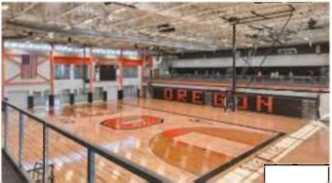
Both photos show ...
The facilities in ... help students ...
They both help ...
Our school should ...
- the first photo / a school canteen
- students / having lunch / their teacher
- second photo / school gym
- both photos I the school facilities
- first photo I the students I not having lessons I while I second photo I the facilities I PE lessons
- facilities I the canteen I students I enjoy I their lunch I the atmosphere
- facilities I the gym I students I get better results I PE lessons
- canteen I gym both I help improve I health I students
- our school / spend more money / upgrade both of them
A The first photo shows A school canteen. The students are having lunch with their teacher
B The second photo is the school gym. Both photos show the school facilities. The first photo shows the students aren't having lessons, while the second photo shows the facilities for PE lessonsl
A The facilities in the canteen help students enjoy their lunch and the atmosphere
B [The facilities in the gym help students get better results in PE lessons
A I l ie canteen and the gym both help improve the health of students. Our school should spend more money to upgrade both of them
Exercise 1. Read the following passage and mark the letter A, B, c, or D on your answer sheet to indicate the correct word or phrase that best fits each of the numbered blanks from 1 to 5
When you first arrive in a foreign culture, often your first reaction is completely positive . Everything seems exciting, different and fascinating. It's an (I) ______________. If you are just on a short holiday, you will probably never leave this phase.
(2) _______, if you stay longer, your attitude can start to change. As you start to realize (3)_______________ little you really understand the new culture, life can get frustrating . People misunderstand what you are trying to say, or they may laugh at you when you say something incorrectly. Even simple things, like posting a letter, can seem very difficult to you. Thus, you are likely to get angry or upset when things go wrong.
With time, though, you start to (4)___________ to become more comfortable with the differences and better able to handle frustrating situations. Your (5)___________ of humor reappears. Finally, you may feel enthusiastic about the culture once again, enjoy living in it, and even prefer certain aspects of the culture to your own.
(Adapted from Navigate - Course book, OUP 2015)
Exercise 2. Read the following passage and mark the letter A, B, c, or D on your answer sheet to choose the word or phrase that best fits each of the numbered blanks from 1 to 5.
After inventing dynamite, Swedish-born Alfred Nobel became a very rich man. However, he foresaw its universally destructive powers too late. Nobel preferred not to be remembered as the inventor of dynamite, so in 1895, just two weeks before his death-, he created a fund to be used for awarding prizes to people who
had made worthwhile contributions to humanity. Originally there were five awards: literature, physics, chemistry, medicine, and peace. Economics was added in 1968, just sixty seven years after the first awards ceremony.
Nobel's original legacy of nine million dollars was invested, and the interest on this sum is used for the awards which vary from $30,000 to $125,000.
Every year on December 10, the anniversary of Nobel's death, the awards (gold medal, illuminated diploma, and money) are presented to the winners. Sometimes politics plays an important role in the judges' decisions. Americans have won numerous science awards, but relatively few literature prizes. No awards were presented from 1940 to 1942 at the beginning of World War 11. Some people have won two prizes, but this is rare; others have shared their prizes.
1. The word "foresaw" in the first paragraph is nearest in meaning to
A. prevailed B. postponed
2. The Nobel prize was established in order to __________ .
A. recognize worthwhile contributions to humanity
B. resolve political differences
c. honor the inventor of dynamite
D. spend money
c. prevented
D. predicted
3. In which area have Americans received the most awards?
A. Literature B. Peace
c. Economics D Science
4. All of the following statements are true EXCEPT __________ .
A. Awards vary in monetary value
B. Ceremonies are held on December 10 to commemorate Nobel's invention;
c. Politics plays an important role in selecting the winners
D. A few individuals have won two awards
5. What is the main idea of this passage?
A. Alfred Nobel became very rich when he invented dynamite.
B. Alfred Nobel created awards in six categories for contributions to humanity.
c. Alfred Nobel left all of his money to science
|D. Alfred Nobel made a lasting contribution to humanity
Exercise 1. Write second conditional sentences for these situations.
1.1 don't have a computer, so I don't play computer games.
- If I had a computer, I'd play computer games.
2. Ben has to get up early on Mondays, so he doesn't go out on Sunday evenings.
-> If Ben didn't get up early on Mondays, he'd go out on Sunday evenings.
3.1 have a lot of homework, so I'll stay in this evening
-> If I didn't have a lot of homework, I wouldn't stay in this evening.
4. We don't have to help with the cooking, so we can watch a DVD.
-> If We had to help with the cooking, we couldn't watch a DVD.
5. There isn't a football match on TV this evening, so they're going out.
-> If there was/ were a football match on TV this evening, they wouldn't go out.
6. Jane doesn't have a ticket for the concert, so she isn't going.
-> If Jane had a ticket for the concert, she'd go.
7.1 don't drive too close to the animals on safari. They don't get scared.
-> If I drove too close to the animals on safari, they would get scared.
8. Tom doesn't have a passport. He can't travel abroad.
■ỳ If Tom had a passport, he would travel abroad.
9. There are so many tourists visiting the national parks. The environment there is badly damaged.
-> If there weren't so many tourists visiting the national parks, the environment there would not bej badly damaged.
10. Tourists throw litter in the river. The water is polluted.
-> If tourists didn't throw litter in the river, the water would not be polluted.,
Exercise 2. Rewrite the sentences below with the same meaning.
1. My brother went out. I arrived home.
-> When I arrived home, mv brother had gone out.
2.1 I went to bed. Nick phoned.
-> When Nick phoned, I had gone to bed.
3. The shoplifter ran away. The police arrived.
-> When the police arrived, the shoplifter had run away
4. The train left. We got to the station.
-> When we got to the station, the train had left.
5. It started to rain. We left the beach. (We were lucky.)
-> When We had left the beach, it started to rain.
6. Dad cooked dinner. Mum got home.
-> When Dad had cooked dinner, Mum got home.
7. The film started. We arrived at the cinema.
-> When we arrived at the cinema, the film had started.
8. Nick bought some greeting cards. He remembered that he had many at home.
-> When Nick had bought some greeting cards, he remembered that he had many at home.
9. The thief escaped before the police arrived.
-> When the police arrived, the thief had escaped.
10. First, he booked the restaurant, and then he invited everybody.
-> Before he invited everybody, he had booked the restaurant.
Exercise 3. Rewrite the following sentences without changing their meaning, using the given words.
1. "Bring me a cup of tea, please," she said to him. -> She asked him to bring her a cup of tea.
2. There is no point in persuading him to change his mind -> It's not worth persuading him to change his mind.
3. This is the first time I have spoken in front of so many people.
-> I was not used to speaking in front of so many people.
4. My father let the children splash around in the pool for a while yesterday.
-> My father allowed the children to splash around in the pool for a while yesterday.
5. It's no use trying to make friends with him.
-> There is no point in trying to make friends with him.
6.1 prefer having dinner at home to going out for dinner.
-> I'd rather have dinner at home than go out for dinner.,
7. He wished he had invited her to his birthday party.
-> He regretted inviting her to his birthday party.
8. You can try to get Jim to lend you his car, but you won't succeed.
-> There's no point in trying to get Jim to lend you his car.
9. She is pleased to meet her grandma again.
-> She looks forward to meeting her grandma again.
10. Why don't you put your luggage under the seat?
-> He suggested putting your luggage under the seat.
Exercise 4. Read the paragraphs of an opinion essay. Put the paragraphs in the correct order and complete the gaps with the phrases below.
1 - On the other hand, money is obviously necessary in today's world. It is very difficult to be happy if you do not have enough money for things like holidays. 2 - However, to my mind it is still possible to be happy and relatively poor, as long as you have enough to buy food and clothing.
3 - In summary, I would say that money can improve the lives of people who do not have enough to live comfortably. However, money alone is not enough to bring happiness; love and friendship are far more important.
In most parts of the developed world, people are richer today than they were fifty years ago. But has money made them happier? This is the question we need to answer.
4 - I firmly believe that money is not the most important thing in most people's lives. They regard friends and family as more important. 5 - For example, if you are feeling miserable about a friendship that had ended, money cannot help you.
6 - What is more, it seems to me that rich people are often the unhappiest. If money really could buy happiness, the rich would be the happiest people in the world. Judging by the stories about them in magazines and on TV, they clearly are not.